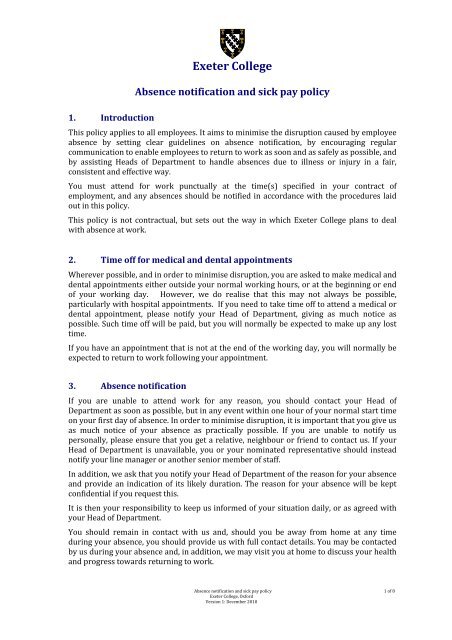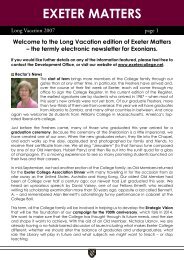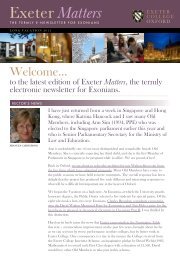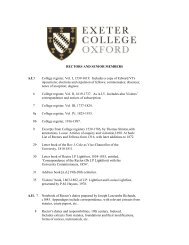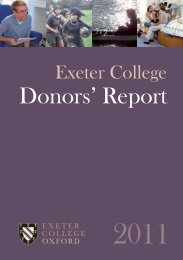Absence notification and sick pay policy - Exeter College
Absence notification and sick pay policy - Exeter College
Absence notification and sick pay policy - Exeter College
You also want an ePaper? Increase the reach of your titles
YUMPU automatically turns print PDFs into web optimized ePapers that Google loves.
1. Introduction<strong>Exeter</strong> <strong>College</strong><strong>Absence</strong> <strong>notification</strong> <strong>and</strong> <strong>sick</strong> <strong>pay</strong> <strong>policy</strong>This <strong>policy</strong> applies to all employees. It aims to minimise the disruption caused by employeeabsence by setting clear guidelines on absence <strong>notification</strong>, by encouraging regularcommunication to enable employees to return to work as soon <strong>and</strong> as safely as possible, <strong>and</strong>by assisting Heads of Department to h<strong>and</strong>le absences due to illness or injury in a fair,consistent <strong>and</strong> effective way.You must attend for work punctually at the time(s) specified in your contract ofemployment, <strong>and</strong> any absences should be notified in accordance with the procedures laidout in this <strong>policy</strong>.This <strong>policy</strong> is not contractual, but sets out the way in which <strong>Exeter</strong> <strong>College</strong> plans to dealwith absence at work.2. Time off for medical <strong>and</strong> dental appointmentsWherever possible, <strong>and</strong> in order to minimise disruption, you are asked to make medical <strong>and</strong>dental appointments either outside your normal working hours, or at the beginning or endof your working day. However, we do realise that this may not always be possible,particularly with hospital appointments. If you need to take time off to attend a medical ordental appointment, please notify your Head of Department, giving as much notice aspossible. Such time off will be paid, but you will normally be expected to make up any losttime.If you have an appointment that is not at the end of the working day, you will normally beexpected to return to work following your appointment.3. <strong>Absence</strong> <strong>notification</strong>If you are unable to attend work for any reason, you should contact your Head ofDepartment as soon as possible, but in any event within one hour of your normal start timeon your first day of absence. In order to minimise disruption, it is important that you give usas much notice of your absence as practically possible. If you are unable to notify uspersonally, please ensure that you get a relative, neighbour or friend to contact us. If yourHead of Department is unavailable, you or your nominated representative should insteadnotify your line manager or another senior member of staff.In addition, we ask that you notify your Head of Department of the reason for your absence<strong>and</strong> provide an indication of its likely duration. The reason for your absence will be keptconfidential if you request this.It is then your responsibility to keep us informed of your situation daily, or as agreed withyour Head of Department.You should remain in contact with us <strong>and</strong>, should you be away from home at any timeduring your absence, you should provide us with full contact details. You may be contactedby us during your absence <strong>and</strong>, in addition, we may visit you at home to discuss your health<strong>and</strong> progress towards returning to work.<strong>Absence</strong> <strong>notification</strong> <strong>and</strong> <strong>sick</strong> <strong>pay</strong> <strong>policy</strong> 1 of 8<strong>Exeter</strong> <strong>College</strong>, OxfordVersion 1: December 2010
• If you are absent through <strong>sick</strong>ness or injury for more than seven calendar days, youmust obtain a Statement of Fitness for Work from your doctor <strong>and</strong> forward it toyour Head of Department.• If a period of medically certified absence is extended by a further Statement(s) ofFitness for Work, you must inform your Head of Department on the same day <strong>and</strong>advise us of the extension of the absence.• If your Statement of Fitness for Work indicates that you are unable to undertake thefull duties of your normal job, but may be able to do some work, we will discuss thiswith you <strong>and</strong> consider any recommendations or suggestions made by your doctorthat may enable you to return to work sooner.• When you return to work after absence due to <strong>sick</strong>ness or injury, you will berequired to complete a self-certification of absence form. Your Head of Departmentwill discuss the details with you <strong>and</strong> will counter-sign the form, provided theinformation that you have supplied is satisfactory. This form will then be retainedon your personnel file, <strong>and</strong> a copy sent to the Accounts Department if there are<strong>pay</strong>ment implications.• If your absence is for reasons other than your own illness, injury or authorisedholidays, you will not normally be entitled to <strong>pay</strong>ment for that period. Exceptions tothis are detailed in our <strong>policy</strong> on parental leave <strong>and</strong> time off for dependants.If you are ill either while absent from work on authorised holiday, or just prior to takingauthorised holiday, see the section ‘<strong>Absence</strong> while on holiday’ below.While absent from work due to illness or injury, you must not take on any other work,either paid or unpaid, without our consent, irrespective of whether you are still receiving<strong>sick</strong> <strong>pay</strong>. You remain our employee <strong>and</strong> are bound by all of the terms <strong>and</strong> conditions of yourcontract of employment.If therapeutic work is recommended for you, we should be informed <strong>and</strong> we will take thenecessary steps to provide this.Failure to comply with the above procedures could affect your entitlement to <strong>sick</strong> <strong>pay</strong> <strong>and</strong>,in some instances, could warrant disciplinary action.4. Sick <strong>pay</strong> <strong>and</strong> benefitsYou will normally be paid contractual <strong>sick</strong> <strong>pay</strong> for absences owing to your illness oraccident, up to a maximum period as follows:Service (as at first day of absence) Full <strong>pay</strong> Half <strong>pay</strong>First 6 months serviceSSP6 months to 1 years’ service 2 weeks 2 weeksDuring 2 nd year of service 2 months 2 monthsDuring 3 rd year of service 3 months 3 monthsDuring 4 th <strong>and</strong> 5 th year of service 5 months 5 monthsDuring 6 th year of service <strong>and</strong> beyond 6 months 6 monthsIn exceptional circumstances, Staff Committee may recommend to Governing Body thatthese periods be extended.Any contractual <strong>sick</strong> <strong>pay</strong> includes any Statutory Sick Pay (SSP) <strong>pay</strong>able for that period.The maximum period of entitlement, which may be made up of one or more periods ofabsence, will be calculated on a rolling 12-month basis <strong>and</strong> backdated from your first dateof absence.If you exhaust your entitlement to contractual <strong>sick</strong> <strong>pay</strong>, you may still be entitled to receiveSSP (see below).<strong>Absence</strong> <strong>notification</strong> <strong>and</strong> <strong>sick</strong> <strong>pay</strong> <strong>policy</strong> 2 of 8<strong>Exeter</strong> <strong>College</strong>, OxfordVersion 1: December 2010
Sick <strong>pay</strong> for part-time employees will be on a pro rata basis to the full-time normal workingweek.The Governing Body reserves the right to discontinue, reduce or re-claim <strong>pay</strong>ments madeunder this scheme, if following a disciplinary investigation, it is found that the terms of thescheme have been abused.Failure to report the reason for your absence or to maintain regular contact with us couldresult in non-<strong>pay</strong>ment, as could repeated instances of short-term absence (where thereappears to be no underlying medical reason for these) or failure to attend an occupationalhealth appointment, if this forms part of your contract. Your entitlement to <strong>sick</strong> <strong>pay</strong> mayalso be affected if <strong>notification</strong> of absence is later than the end of the first qualifying day ofabsence.In the event of the self-certification of absence form not being counter-signed by your Headof Department, line manager or another senior member of staff, the days of absence will betreated as uncertified <strong>and</strong> you will not receive <strong>pay</strong>ment. If you are not satisfied that yourclaim has been fairly h<strong>and</strong>led, you should use our grievance procedure.Any benefits you receive under your contract of employment will normally continue duringany period of absence lasting less than 13 weeks. Where these are benefits in kind offeredwhile you are on duty (e.g. meals), you will not be entitled to receive any financialcompensation for the loss while you are absent from work <strong>and</strong> unable to avail yourself ofthem.Statutory leave will continue to accrue during periods of long-term <strong>sick</strong>. Contractual leave inexcess of this will cease to accrue after 8 weeks' absence <strong>and</strong> will only start to accrue againonce you return to work.5. Statutory Sick Pay (SSP)You are entitled to SSP provided you meet the detailed requirements of the scheme. Thereare, however, some categories of employees who are excluded from receiving SSP for someof the time. You are excluded if:• your average weekly earnings are less than the lower earnings limit for NationalInsurance contributions• you are away <strong>sick</strong> within 57 days of a previous claim from the Department of Work<strong>and</strong> Pensions (DWP) for one of the following state benefits:o <strong>sick</strong>ness benefit (not SSP)o invalidity pensiono non-contributory invalidity pensiono maternity allowanceo unemployment benefit, if it follows an entitlement to invalidity pension• you have not done any work for us under your contract of employment• you are away <strong>sick</strong> during a stoppage of work due to a trade dispute, unless you havenot taken part in the trade dispute <strong>and</strong> have no direct interest in it• you are pregnant <strong>and</strong> your absence occurs during the qualifying period for StatutoryMaternity Pay (SMP) which commences with:o the beginning of the week you are first entitled to SMP or the fourth weekbefore your expected week of confinement; oro the beginning of the week you are first entitled to Maternity Allowance(MA) from the DWP; oro the beginning of the fourth week before your expected week ofconfinement if you cannot get SMP or MA.<strong>Absence</strong> <strong>notification</strong> <strong>and</strong> <strong>sick</strong> <strong>pay</strong> <strong>policy</strong> 3 of 8<strong>Exeter</strong> <strong>College</strong>, OxfordVersion 1: December 2010
• you are <strong>sick</strong> whilst working abroad <strong>and</strong> not in an EU country• you are in legal custody.Qualifying days for SSPUnless otherwise specified in your contract of employment, the days on which you wouldnormally have worked had you not fallen <strong>sick</strong> will be identified as your qualifying days forSSP.Waiting daysYou will be eligible for SSP on the fourth qualifying day in a 'period of incapacity'. The firstthree qualifying days are known as 'waiting days', <strong>and</strong> there is no entitlement to SSP forthese days.Linked periods of absenceTwo or more continuous spells of <strong>sick</strong>ness both lasting at least four days, which areseparated by 56 calendar days or less, are linked together <strong>and</strong> counted as one. This meansthat if you have already had your three waiting days in a period of incapacity, <strong>and</strong> then havea second linked spell within 56 days, SSP will be <strong>pay</strong>able from the first qualifying day in thesecond spell.Duration of <strong>pay</strong>mentProvided you meet the eligibility criteria, SSP is <strong>pay</strong>able for up to 28 weeks of <strong>sick</strong>nessabsence in either:• one period of incapacity for work, or• any number of periods linked by 56 calendar days (8 weeks) or less. These cannotextend for more than three years.Amount of SSPThe government fixes the rate of SSP, which is normally reviewed annually. To be entitledto SSP you must earn at least the equivalent of Class One National Insurance LowerEarnings limit. SSP is subject to Income Tax <strong>and</strong> National Insurance deductions. The amountof SSP will be shown on your <strong>pay</strong>slip.6. Return to work after absenceWhen you return to work, it is our <strong>policy</strong> that all employees are seen, informally, by theirHead of Department as soon as possible. The reasons for your absence will be discussed inappropriate detail depending on the nature <strong>and</strong> frequency of your absence(s).Your Head of Department will also brief you on any developments that occurred in yourarea of work during your absence, <strong>and</strong> will discuss your workload <strong>and</strong> how best to minimiseany disruption that may have been caused by your absence. He or she will also need toknow whether you are fully fit to return or whether you should refrain from any tasks forhealth reasons.If for any reason you find it difficult to discuss the reasons for your absence with your Headof Department, or would prefer to speak to another Head of Department of your own sex,you should ask for this <strong>and</strong> we will make every effort to arrange it.If a phased return to work has been agreed, <strong>pay</strong>ment will depend on the circumstances <strong>and</strong>the duration of the part-time working arrangement. If contractual <strong>sick</strong> <strong>pay</strong> is exhausted,you will be paid pro rata for the hours you are able to work at your normal basic hourly rateduring a phased return (subject to you earning at least the rate of SSP). If you have notexhausted your contractual <strong>sick</strong> <strong>pay</strong>, you will continue to receive contractual <strong>sick</strong> <strong>pay</strong> <strong>and</strong>the balance between worked hours <strong>and</strong> normal working hours will be deducted from this<strong>Absence</strong> <strong>notification</strong> <strong>and</strong> <strong>sick</strong> <strong>pay</strong> <strong>policy</strong> 4 of 8<strong>Exeter</strong> <strong>College</strong>, OxfordVersion 1: December 2010
allowance. If you are being paid SSP only, this will be your minimum rate of <strong>pay</strong> while youare on a phased return to work programme. If you wish to continue your reduced hoursindefinitely, you should ask your Head of Department to consider a permanent change toyour contract of employment <strong>and</strong> we will discuss the implications of this with you.7. Medical reportsWe reserve the right, at any time during your employment, to require you to attend anindependent medical examination, or to ask permission to contact your doctor or consultantfor a report. You will be asked to give your prior written consent before we approach adoctor or consultant who is treating you, <strong>and</strong> you will be given a form to sign, whichexplains your rights <strong>and</strong> obligations under the Access to Medical Reports Act.We would normally request such a report in any or all of the following circumstances:• where you complain of an ongoing health problem that is affecting your ability todo your job;• where you complain that any aspect of your job is creating a health problem;• where your absence gives us cause for concern;• where you have been absent for some time <strong>and</strong> there is doubt about when youmay be able to return to work.We may also request a medical report if we are considering dismissal for either a long-termhealth problem or unsatisfactory attendance made up of repeated short absences. Inaddition, if you have any health problem that could be considered a disability, we wouldwish to seek a report in order to obtain guidance on what, if any, reasonable adjustmentsshould be made to assist you in performing your duties satisfactorily.You are required to co-operate with our procedures, including providing medical advice,<strong>and</strong> ensuring we are kept informed of any developments in your treatment or condition.In addition to the above, we have contracted external occupational health advisors whomwe may ask to advise us generally, <strong>and</strong> also to assist with the rehabilitation of thosereturning after lengthy absences or following serious illness or injury. If your contractcontains a clause requiring this, you are obliged to co-operate with us by attending anyoccupational health assessments organised for you. Failure or refusal to do so would be abreach of your contract, <strong>and</strong> could also lead to any contractual <strong>sick</strong> <strong>pay</strong> being withdrawn.8. Excessive absenteeismIf you have a number of short absences that together comprise an unacceptable overall levelof absence, you will be seen by your Head of Department to discuss the frequency <strong>and</strong>reasons for these absences. This will be done in accordance with our disciplinary procedure,on grounds of unsatisfactory attendance, <strong>and</strong> will apply irrespective of whether theabsences are believed to be genuine or not.Your Head of Department will explain to you what we consider to be an "acceptable" level ofattendance. What is "acceptable" may be different depending on the nature of the work, theability of your department to provide cover, your length of service, your previous absencehistory, the reasons given for the absences <strong>and</strong> the treatment of other employees in similarsituations.Failure to reach an acceptable level of attendance may result in disciplinary action. If,despite warnings, your attendance remains unsatisfactory, you may be dismissed. Prior todismissal, you will be sent a letter inviting you to attend a formal meeting to discuss yourattendance. You may be accompanied at this meeting by a colleague or a trade unionrepresentative. The reasons for your absence, <strong>and</strong> your level of attendance, will be fullydiscussed with you. If a decision is taken to dismiss, this will be confirmed in writing <strong>and</strong><strong>Absence</strong> <strong>notification</strong> <strong>and</strong> <strong>sick</strong> <strong>pay</strong> <strong>policy</strong> 5 of 8<strong>Exeter</strong> <strong>College</strong>, OxfordVersion 1: December 2010
you will be informed of your right of appeal <strong>and</strong> our appeals procedure. For further details,please refer to the disciplinary procedure.9. Long-term <strong>sick</strong>nessIf you are absent from work for a period in excess of 8 weeks, we will normally makearrangements to see you, either at work or at home, to update ourselves on your progress<strong>and</strong> to ask for your permission to obtain a doctor's or consultant's report. You have the rightto refuse this permission, but it should be emphasised that the reason for this request is tohelp us manage the situation <strong>and</strong> it will usually be to your advantage to enable us to getfurther information about your likely date of return to work, whether any medicalrestrictions should be placed on your activities, <strong>and</strong> whether you have any condition thatwould be classed as a disability under the Disability Discrimination Act.If you are about to exhaust your entitlement to either SSP or company <strong>sick</strong> <strong>pay</strong>, we will aimto give you notice of this.You may, if you choose, request to take some of your annual leave during periods of<strong>sick</strong>ness absence, or prior to returning to work. If you are unable to take at least yourstatutory holiday entitlement during the holiday year (including any public/bank holidaystaken as paid leave), the shortfall may be carried forward into the next holiday year.Statutory leave will continue to accrue during periods of long-term <strong>sick</strong>ness absence. After 8weeks’ absence, contractual leave in excess of the statutory leave will cease to accrue <strong>and</strong>will only resume once you return to work.If your absence continues at a level that we deem unacceptable, or if it becomes evident thatthere is little likelihood of you returning to work, we will reassess the situation <strong>and</strong> it maybe that you will be dismissed on health grounds.If dismissal is being considered, we will write to you, giving you advance notice of a formalmeeting with you to discuss the situation. You may, if you wish, be accompanied at thismeeting by a colleague or a trade union representative. Before reaching a decision, we willtake into account the nature of your illness, any advice we have received from your doctoror consultant as to your return to work <strong>and</strong> future capabilities, your length of service withus, previous absence history, <strong>and</strong> performance. If your absence is for a reason related to adisability, we will also wish to explore any ways of accommodating this.If a decision is taken to dismiss, this will be confirmed to you in writing, together with yourright of appeal <strong>and</strong> our appeals procedure.10. Health concerns <strong>and</strong> contact with infectious <strong>and</strong> contagious diseasesIf at any time during your employment you suspect you may be suffering from, or arediagnosed as suffering from, any condition that may affect your ability to do your job, youare required to notify your Head of Department in order that we may take all reasonablesteps to ensure your well-being at work.If you have been in contact with an infectious or contagious disease (including diphtheria,typhoid, paratyphoid, polio or tuberculosis), you should report the fact immediately to yourHead of Department <strong>and</strong> then consult your doctor to obtain advice as to whether it isnecessary to remain away from work. Such absence will be treated as paid <strong>sick</strong> leave.In addition, food h<strong>and</strong>lers suffering from a bowel disorder, boils, skin or mouth infectionmust not report for work without clearance from their doctor.If you have been in contact with measles, mumps, whooping cough, German measles(rubella) or chicken pox you need not normally remain away from work.<strong>Absence</strong> <strong>notification</strong> <strong>and</strong> <strong>sick</strong> <strong>pay</strong> <strong>policy</strong> 6 of 8<strong>Exeter</strong> <strong>College</strong>, OxfordVersion 1: December 2010
11. Accidents while at workIf your absence is related in any way to an accident at work, you are reminded of the need tofill in an accident report form <strong>and</strong> notify the Health <strong>and</strong> Safety Assistant.12. <strong>Absence</strong> while on holidayIf you fall <strong>sick</strong> either prior to commencing planned holiday absence, or during a period ofpaid holiday, <strong>and</strong> would otherwise be unable to take at least four weeks' holiday in thisholiday year (including any public/bank holidays taken as paid holiday), you may requestthat the period of illness during your authorised holiday is converted to <strong>sick</strong> leave <strong>and</strong> theholiday be taken at a later date.In this case, you are required to contact your Head of Department by telephone on each dayof your illness to confirm that you are ill <strong>and</strong>, if you would be entitled to contractual <strong>sick</strong> <strong>pay</strong>during this period, provide a Statement of Fitness to Work covering the total period of yourabsence. Note that self-certification of absence may suffice for SSP, but is not regarded assufficient for the <strong>pay</strong>ment of contractual <strong>sick</strong> <strong>pay</strong> while absent on pre-authorised holiday.If you fall <strong>sick</strong> on a working day directly before or after a public/bank holiday, or directlybefore or after absence for pre-authorised holiday of any duration, you may be required toproduce a medical certificate in order to qualify for <strong>sick</strong> <strong>pay</strong>.13. Emergency time off for dependantsYou are reminded that our absence <strong>policy</strong> <strong>and</strong> <strong>pay</strong>ment schemes relate to absence due toyour own illness or injury, not that of other members of your family or dependants. Shouldyou need emergency time off to deal with the urgent unforeseen needs of a dependant,reasonable time off will be authorised, but this will be unpaid.14. Other unauthorised absenceIf you expect to be late on any occasion, you should inform your Head of Department or linemanager to explain the circumstances of the delay <strong>and</strong> advise him/her of your anticipatedtime of arrival. You are expected to make every possible attempt to attend work when youexperience difficulties <strong>and</strong> disruptions to your normal means of transport, e.g. because ofstrike action, the failure of public or private transport, or adverse weather conditions. If youare aware of or experience any difficulties, you should notify your Head of Department orline manager as soon as possible <strong>and</strong> explain the reasons. If you are late, you will normallybe expected to make up the time on the same day or on a subsequent day.<strong>Absence</strong>s due to severe travelling difficulties may be authorised as unpaid leave, or taken asannual leave, providing your Head of Department or line manager is satisfied that you havemade all reasonable attempts to get to work. Persistent lateness may result in disciplinaryaction, further details of which can be found in the disciplinary procedure.15. <strong>Absence</strong> records <strong>and</strong> monitoringDetails of an employee's health, either physical or mental, are categorised as "sensitivepersonal data" under the Data Protection Act. Health records are therefore kept in a lockedfiling cabinet in the Bursary.<strong>Absence</strong> <strong>notification</strong> <strong>and</strong> <strong>sick</strong> <strong>pay</strong> <strong>policy</strong> 7 of 8<strong>Exeter</strong> <strong>College</strong>, OxfordVersion 1: December 2010
A record for each employee is kept, detailing the number of days absent, dates <strong>and</strong> reasonsgiven. These records are kept by the HR Officer, <strong>and</strong> you <strong>and</strong> your Head of Department orline manager have the right to request to see your individual details at any time. Please givethe HR Officer reasonable notice of your requirement, so that he or she can collate therecords.Our overall absence figures <strong>and</strong> the reasons for these will be reviewed <strong>and</strong> analysed by theHR Officer <strong>and</strong> Heads of Department on a regular basis in order to identify any trends orany areas of concern. Where areas of concern are highlighted, action will be taken to try toidentify the causes <strong>and</strong> take appropriate action.16. Implementation, monitoring <strong>and</strong> review of this <strong>policy</strong>This <strong>policy</strong> will take effect from 1 September 2011. The Governing Body of the <strong>College</strong> hasoverall responsibility for implementing <strong>and</strong> monitoring this <strong>policy</strong>, which will be reviewedon a regular basis following its implementation <strong>and</strong> may be changed from time to time.Any queries or comments about this <strong>policy</strong> should be addressed to the HR Officer.<strong>Absence</strong> <strong>notification</strong> <strong>and</strong> <strong>sick</strong> <strong>pay</strong> <strong>policy</strong> 8 of 8<strong>Exeter</strong> <strong>College</strong>, OxfordVersion 1: December 2010


